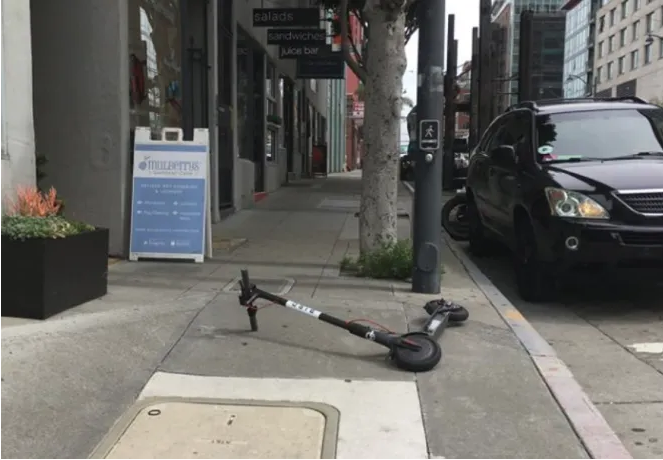Scooters are coming back en masse to San Francisco. SFTMA, after a year of its initial scooter pilot program, is going to raise its cap significantly.
From the SFMTA's release:
The SFMTA is moving forward with the next phase of the Powered Scooter Share Permit Program. Over the last year, this program permitted two operators and up to 2,100 scooters for shared use, mostly in the eastern parts of the city. The new round of permits will be issued to four operators and up to 4,000 scooters, with more than double the service area, along with a list of new terms and conditions based on lessons learned. We realize that different modes of mobility are an important part of the transportation network and the "last mile" solution to your commute is just as important as the first mile.
The four operators are Jump, Lime, Scoot and Spin. There's more to read in the SF Chron, SF Examiner, TechCrunch, etc. It's the 'Revenge of the Scooters,' 'Scooterpocolypse Redux," or whatever--apparently the mainstream press still thinks this is a very important issue.
Maybe I'm just jaded, but I have to admit it: I'm over the whole kick-scooter thing.
Maybe it's because, just like the advocates at the SFBC and Walk San Francisco, part of my job is to meet with people who have lost loved ones to traffic violence. To date, none of them have been killed by scooters. And yet I can walk on any block in the city and watch crazy, dangerous, egregious and unaccountable behaviors from people driving two-to-five ton motor vehicles that can--and often do--crush human bodies and ruin and end lives. I came within a second of becoming a victims myself not too long ago, for the crime of buying some groceries. I was walking across a Trader Joe's parking lot when a motorist zoomed out of a parking spot and careened into the parked car I'd just walked past.
I've had close calls with scooterists too, but let's keep some perspective on the relative consequences.
Also, did I mention this means SF may soon see 10,000 e-scooters citywide?
— Joe Fitzgerald Rodriguez (@FitzTheReporter) September 25, 2019
Right now, there are only 2,000. https://t.co/1lwRhhEpCy
Joe Fitz might have mentioned that's along with the some half-million motor-vehicles registered in San Francisco, plus the hundreds of thousands more that come into the city every day. What should we be more concerned with? Let's remember: the Vision Zero initiative is failing. We've had 23 fatalities this year in San Francisco thanks to traffic violence--plus some 500 serious injuries.
That's not because of scooters. It's because of cars and trucks and the sub-standard road designs, poor urban planning, and lack of enforcement that invites unsafe driving.
Imagine if all the resources and hours SFMTA spent on scooter regulations were instead spent on building more bulb outs and protected bike lanes. I mean that literally: what if the bureaucrats who were tasked with writing the regs had instead been transferred to street crews to help build safety infrastructure. It seems probable that there would be one more person alive today, or one less person with life-changing injuries.
Was that life worth swapping for scooter regulations that might one day spare someone a sprained wrist or a broken toe?
If scooters remain popular in the long run, it may help build support, or even help fund, protected bike lanes and safer streets. But on the whole, scooters are a distraction. They're pulling resources and focus from protecting all vulnerable road users, including scooterists themselves, from the real killers: cars and trucks.
What do you think? Has SFMTA spent too much time regulating scooters and not enough making streets safe? Is the mainstream press missing the point by focusing so much attention on scooters? Comment below.






